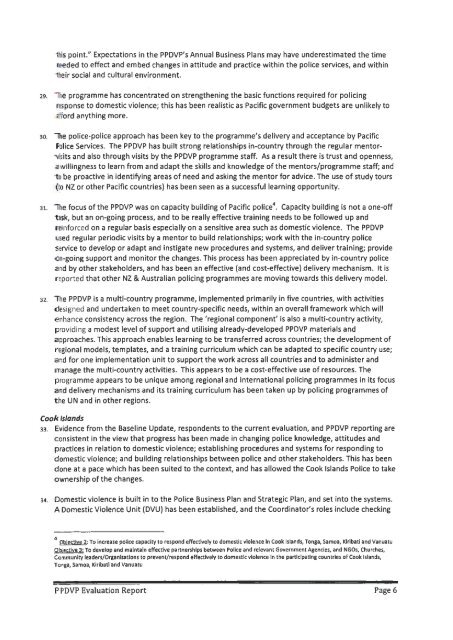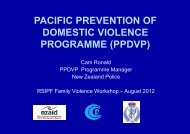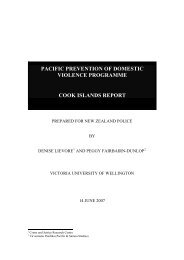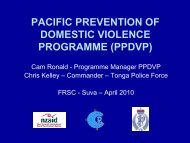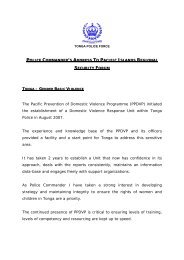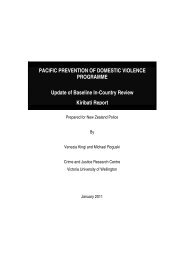PPDVP Evaluation Report - Pacific Prevention of Domestic Violence ...
PPDVP Evaluation Report - Pacific Prevention of Domestic Violence ...
PPDVP Evaluation Report - Pacific Prevention of Domestic Violence ...
You also want an ePaper? Increase the reach of your titles
YUMPU automatically turns print PDFs into web optimized ePapers that Google loves.
this point." Expectations in the <strong>PPDVP</strong>1s Annual Business Plans may have underestimated the timeneeded to effect and embed changes in attitude and practice within the police services, and withintheir social and cultural environment.29. 7he programme has concentrated on strengthening the basic functions required for policingresponse to domestic violence; this has been realistic as <strong>Pacific</strong> government budgets are unlikely toc7Fiord anything more.30. lhe police-police approach has been key to the programme's delivery and acceptance by <strong>Pacific</strong>Police Services. The <strong>PPDVP</strong> has built strong relationships in-country through the regular mentoruisitsand also through visits by the <strong>PPDVP</strong> programme staff. As a result there is trust and openness,awillingness to learn from and adapt the skills and knowledge <strong>of</strong> the mentors/programme staff; and-to be proactive in identifying areas <strong>of</strong> need and asking the mentor for advice. The use <strong>of</strong> study tours(b~ NZ or other <strong>Pacific</strong> countries) has been seen as a successful learning opportunity.31. lhe focus <strong>of</strong> the <strong>PPDVP</strong> was on capacity building <strong>of</strong> <strong>Pacific</strong> police4. Capacity building is not a one-<strong>of</strong>ftask, but an on-going process, and to be really effective training needs to be followed up andreinforced on a regular basis especially on a sensitive area such as domestic violence. The <strong>PPDVP</strong>used regular periodic visits by a mentor to build relationships; work with the in-country policeservice to develop or adapt and instigate new procedures and systems, and deliver training; providean-going support and monitor the changes. This process has been appreciated by in-country policeand by other stakeholders, and has been an effective (and cost-effective) delivery mechanism. It isreported that other NZ & Australian policing programmes are moving towards this delivery model.32. The <strong>PPDVP</strong> is a multi-country programme, implemented primarily in five countries, with activitiesdesigned and undertaken to meet country-specific needs, within an overall framework which willenhance consistency across the region. The 'regional component' is also a multi-country activity,providing a modest level <strong>of</strong> support and utilising already-developed <strong>PPDVP</strong> materials andapproaches. This approach enables learning to be transferred across countries; the development <strong>of</strong>regional models, templates, and a training curriculum which can be adapted to specific country use;and for one implementation unit to support the work across all countries and to administer andmanage the multi-country activities. This appears to be a cost-effective use <strong>of</strong> resources. Theprogramme appears to be unique among regional and international policing programmes in its focusand delivery mechanisms and its training curriculum has been taken up by policing programmes <strong>of</strong>the UN and in other regions.Cook Islands33. Evidence from the Baseline Update, respondents to the current evaluation, and <strong>PPDVP</strong> reporting areconsistent in the view that progress has been made in changing police knowledge, attitudes andpractices in relation to domestic violence; establishing procedures and systems for responding todomestic violence; and building relationships between police and other stakeholders. This has beendone at a pace which has been suited to the context, and has allowed the Cook Islands Police to takeownership <strong>of</strong> the changes.34. <strong>Domestic</strong> violence is built in to the Police Business Plan and Strategic Plan, and set into the systems.A <strong>Domestic</strong> <strong>Violence</strong> Unit (DVU) has been established, and the Coordinator's roles include checking4 Objective 2: To increase police capacity to respond effectively to domestic vlolence In Cook Islands, Tonga, Samoa, Kiribati and VanuatuObiective 3: To develop and maintain effective partnerships between Police and relevant Government Agencies, and NGOs, Churches,Community leaders/Organisations to preventlrespond effectively to domestic violence in the partlcipatlng countries <strong>of</strong> Cook Islands,Tonga, Samoa, Kiribati and VanuatuP PDVP <strong>Evaluation</strong> <strong>Report</strong> Page 6


